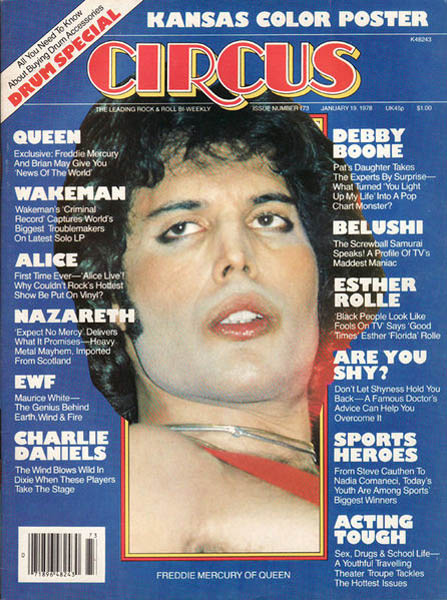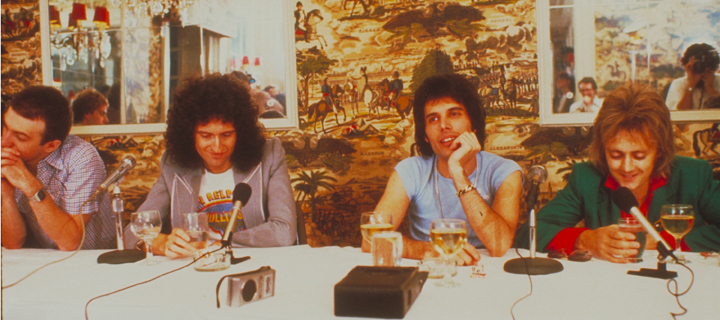Circus Magazine 19 January 1978
QUEEN DESERVES ROCK’S ROYAL CROWN?
by Rosy Horid
Circus Magazine 19 January 1978

Freddie Mercury and Brian May Hawk their ‘News Of The World’
Freddie Mercury is no longer the leader of Queen. Has he been fired, you ask, or is he off to pursue a solo career? No it’s simply, with the advent of News Of The World LP (Asylum) the personality of the music and of Brian May, drummer Roger Taylor and bassist John Deacon have come across more strongly than ever before.
Those who have seen them on the recent US tour notice more than ever before that they’re a group comprised of four separate identities, not just a lead singer and background band. Freddie Mercury is delighted to hear it.
‘I’ve never considered myself the leader anyway,’ says irrepressible Freddie. ‘The most important person, perhaps.’ And guitarist May agrees.
‘Our separate identities do come to the fore on this album, on which every cut is completely different from the one before it and there’s no concept at all. Apart from each having contributed two tracks to the album, Roger and John have been much more involved in the playing. Roger plays rhythm guitar on some of his cuts (‘Sheer Heart Attack’ and ‘Fight From The Inside’) which makes sense, because he had a better idea of how he wanted it to go. John plays acoustic guitar on one of his as well (‘Who Needs You’). I played maracas on it. While we may not do it that way on stage, in the studio that makes more sense.’
Brian also does a lot more singing of his own songs on News, but he’s content to let Freddie do the singing on stage.
‘He’s a natural performer,’ asserts Brian. ‘He acts on stage as if he was born doing it. That’s great for us. We wouldn’t want it any other way.’
As May and Mercury emphasize, it’s not just musically that shifts occur in the group.
‘John keeps a very close eye on our business affairs,’ says Freddie. ‘He knows everything that’s going on and shouldn’t be going on. If God forsakes us now the rest of the group won’t do anything unless John says it’s all right.
‘Roger is very important to us in a different way. He’s always been an out-and-out rock & roll fan with no time to stop and think about music and that’s very good for us. Instinct. He’s also the one who is most aware of facets in music, and that’s essential in the band. If you listen to ‘Sheer Heart Attack’ on the new album you’ll see what we mean. It sounds like a punk, or ‘new wave’ song, but it was written at the same time of the Sheer Heart Attack LP. He played it to us then but it wasn’t quite finished and he didn’t have time to complete it before we started recording. That was three years ago and now. . .almost all these records you hear are like that period.’ And Roger now? ‘He was into punk for a long time, but he’s tired of it.’ More about the album later.
But if you still don’t believe no crown of ladership rests on the mercurial head of Freddie, it’s worth repeating his comment about the composition of the group.
‘If anyone left Queen, anyone of the four, that would be the end of Queen. We are four equal, interwoven parts. And the others just couldn’t function the same without each quarter.’
Queen have just finished a special tour of the states. Not the longest they’ve ever undertaken, by any means, but special nevertheless.
‘It was the first tour we’ve ever done without the support band,’ Freddie explained. ‘There was so much going on on stage that I doubt there would have been room for another band anyway. We have so much material we want to play for people now that it would have been far too long a concert. It’s hard enough anyway to know what to leave out: we’d like to play all the new material, but there are some things we just would not dare leave out or I think the fans would lynch us.’
It was the sort of tour most rock bands dream of doing. Brian agrees: ‘We’ve managed to get some of the most sought after halls there are, even though the tour was short. Most of them are places we’ve played before. In some cities we had to settle for second, alternative choice auditoriums – the thing was set up so fast. It was also a very compressed tour – 35 dates in six weeks. We did very large halls because we wanted to do a fuller show and our rig was about twice as big as ever we used before.
‘It provided a complete stage environment, with an extension stage, three trailers and enormous lighting gimmick not just for New York and Los Angeles. That’s why we booked big halls, so that we could give everybody the complete show. We first used our crown centerpiece at London’s Earl’s Court concert over the Jubilee. At the time, we didn’t envisage being able to take the crown on tour with us, but we managed to have it demounted into a portable object. And so we had it for all the gigs. It made the most ambitious backdrop we’ve ever attempted, but it was worth it. The fans seemed to enjoy it and they are what matter.’
That last remark of Brian’s is typical of the group’s attitude towards their fans, for they have one of the closest rapports with the fans of any in the business. The same cannot be said for their relationship to the music press, however, especially in Britain. In fact, many people thought the chart-popping single ‘We Are The Champions,’ was Queen’s way of telling the press in no uncertain terms that they’ve made it without them. Others thought it an arrogant statement about their rock supremacy. But how do they feel? First Freddie, who wrote the song:
‘Certainly it’s a relationship that could be, but I was thinking about football when I wrote it. I wanted a participation song, something that the fans could latch on to. It was aimed at the masses; I thought we’d see how they took it. It worked a treat. When we performed it at a private concert in London, the fans actually broke into a football chant between numbers. Of course, I’ve given it more theatrical subtlety than an ordinary football chant. You know me.
‘I certainly wasn’t thinking about the press when I wrote it. I never think about the British music press these days. It was really meant to be offered the musicians the same as the fans.
‘I suppose it could also be construed as my version of ‘I Did It My Way.’ We have made it, and it certainly wasn’t easy. No bed of roses as the song says. And it’s still not easy.’
Brian concurs, ‘You know, songs aren’t always about what the words say. Messages in songs can appear different. I always see that as the difference between prose and poetry. Prose can mean exactly what it says, while poetry can mean the opposite. That goes for this song. Freddie’s stuff is often tongue-in-cheek anyway, as you know. This song is very theatrical. Freddie is very close to his art. You could say, he’s married to his music, whether it’s ‘I Did It My Way’ or his ‘There’s No Business Like Show Business.’ I must say, when he first played it for us in the studio we all fell on the floor with laughter. So many people in the press hate us because we’ve side-stepped them and got where we have without them.
‘But there’s no way the song says anything against our audiences. When the song says ‘we,’ it means ‘us and the fans.’ When we did that special concert, the fans were wonderful. They understood it so well. I know it sounds corny, but it brought tears to our eyes.’
Freddie and Brian are unanimous on that: the spontaneous responses to ‘We Are The Champions’ really move them. But that is the kind of general response News Of The World has received because, as Brian may says, ‘It’s a spontaneous album. I think we’ve managed to cut through to the spontaneity lacking in our other albums. I have no apologies to make for any of our previous albums. We’re proud of them and wouldn’t have let them out if we weren’t. But I now feel some may have been over-produced, so we wanted to go with a more spontaneous rock & roll based album. It was nice to do something that didn’t need such intensity. For example, with ‘Sleeping On The Sidewalk’ we did it in one take because it just seemed right the first time. We like to think of the album as a window on an unguarded moment, not a set piece. Each cut seems to do that, from the participation songs to Freddie’s mood pieces. Even his numbers on the album are different, from his heavy ‘Get Down, Make Love’ to ‘My Melancholy Blues,’ which is just what it says.’
Brian admits that his own material is different too. But he still tries to keep his private life separate and out of his songs as much as possible.
‘If you don’t keep something back, it can be very bad for you.’
But for the band both the album and the tour are in the past and they have to look at the future. They got back to England on Christmas Eve.
‘My mother would have killed me if I wasn’t home for Christmas. I haven’t missed one yet,’ says Freddie. And the others felt the same.
It’s time for some stock-taking. We’ve all become businessmen,’ admits Freddie, ‘even though it’s against our better judgment. It’s something that always happens if you get successful. Being a musician is not just cutting discs, unfortunately. I wish it was. We’ve all got companies now, some connected to music, others not. I’m producing Peter Straker, I have my car company. . . and lots of other fingers in other pies. We must take some time off to get things in perspective, or things will start to go wrong.
‘Then there’s been talk of doing a big world tour – Britain, South America, Japan, and of course the States as well as lots of other places. But that won’t be until later in the year.’
So, American fans will have a chance to see Queen in 1978.
‘You must tell them not to be too greedy, thought,’ warns Freddie. They’ve already seen more of us than any other country.’
And what about a message for the American fans, Freddie?
‘They know we love them. Apart from that, oh, say something outrageous for me.’*

Queen 1978